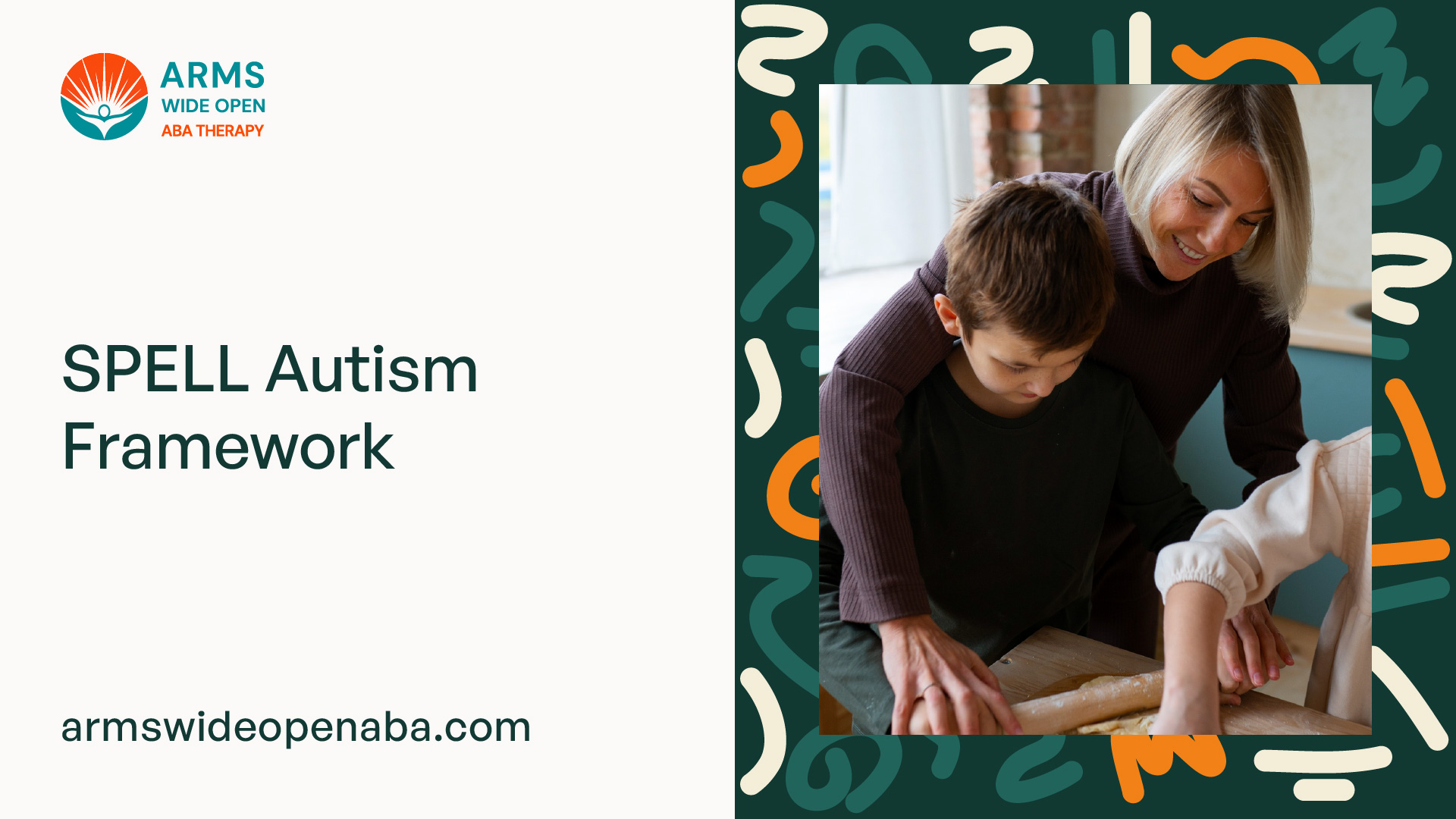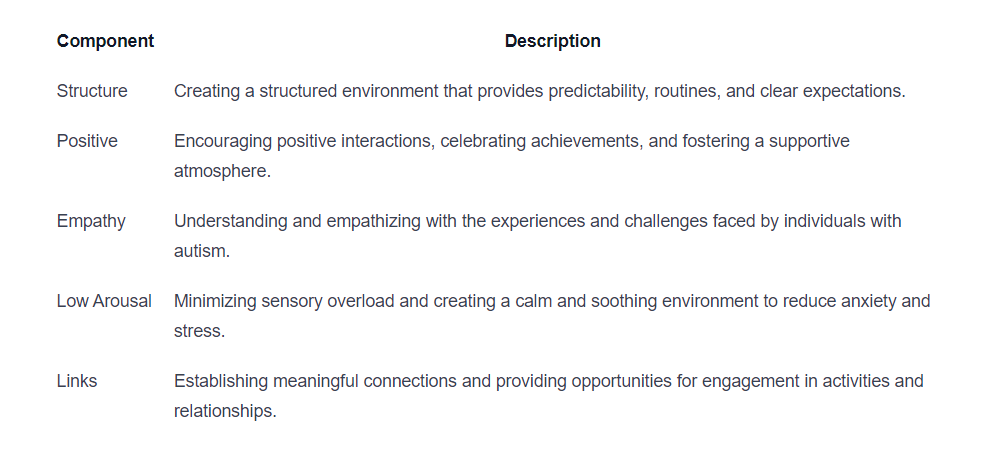SPELL Autism Framework
Unlock the power of the SPELL autism framework. Empower and support individuals with autism for a better quality of life.

Understanding Autism Support
Support plays a crucial role in the lives of individuals with autism. It helps them navigate everyday challenges, develop essential skills, and lead fulfilling lives. One framework that has proven effective in providing autism support is the SPELL framework.

Importance of Support for Individuals with Autism
Support is essential for individuals with autism to thrive and reach their full potential. Autism is a neurodevelopmental disorder that affects social interaction, communication, and behavior. With the right support, individuals with autism can overcome challenges, build meaningful connections, and lead independent lives.
Support for individuals with autism extends beyond their immediate needs. It encompasses various aspects of their lives, including education, employment, relationships, and overall well-being. It aims to create an inclusive environment that promotes understanding, acceptance, and empowerment.
Overview of the SPELL Framework
The SPELL framework is a comprehensive approach to autism support that focuses on creating an environment that is Structured, Positive, Empathetic, Low Arousal, and provides Links to meaningful activities and relationships. Each component of the framework plays a vital role in ensuring the well-being and development of individuals with autism.

By incorporating the SPELL framework into autism support, individuals with autism can experience a holistic approach that addresses their unique needs and promotes their overall well-being.
Understanding the importance of support for individuals with autism and the fundamentals of the SPELL framework lays the foundation for effective implementation. Let's explore the specific components of the SPELL framework and how they contribute to empowering individuals with autism.
Components of the SPELL Framework
The SPELL Framework is a comprehensive approach to supporting individuals with autism. It consists of several key components that work together to create an empowering and inclusive environment.
Structure
Structure refers to the importance of providing a structured and predictable environment for individuals with autism. This includes clear routines, schedules, and visual supports that help individuals understand what is expected of them. By establishing a consistent structure, it helps to reduce anxiety and increase feelings of security and stability.
Positive
The positive component of the SPELL Framework focuses on promoting positive interactions and relationships. It emphasizes the use of positive reinforcement, encouragement, and praise to motivate and engage individuals with autism. By focusing on strengths and building on successes, it helps to enhance self-esteem and foster a positive self-image.
Empathy
Empathy plays a crucial role in the SPELL Framework by promoting understanding and compassion. It encourages individuals to see the world from the perspective of someone with autism and to acknowledge and respect their unique experiences and challenges. Practicing empathy helps to create a supportive and accepting environment where individuals feel valued and understood.
Low Arousal
The low arousal component of the SPELL Framework recognizes the importance of creating a calm and sensory-friendly environment. Individuals with autism often experience sensory sensitivities, and a low arousal environment helps to minimize overwhelming stimuli. This can include reducing noise levels, providing comfortable spaces for relaxation, and using sensory tools to support self-regulation.
Links
The links component of the SPELL Framework emphasizes the importance of establishing meaningful connections between individuals with autism and their communities. It involves creating opportunities for social interaction, engagement in community activities, and developing relationships with peers, family members, and support professionals. These links help individuals with autism feel included and connected to the world around them.
By combining these components, the SPELL Framework provides a holistic approach to autism support. It recognizes the unique needs and strengths of individuals with autism and aims to create an environment that promotes their well-being, independence, and overall quality of life.
Implementing the SPELL Framework
To effectively support individuals with autism, it is crucial to implement the SPELL framework. This section will discuss two important aspects of implementing the SPELL framework: training and education, and practical application in daily life.
Training and Education
Proper training and education are essential for individuals and professionals involved in supporting individuals with autism. By gaining knowledge and understanding of the SPELL framework, they can effectively implement its principles and strategies.
Training programs should focus on providing comprehensive information about autism, its characteristics, and the specific needs of individuals on the autism spectrum. This includes understanding the importance of structure, positive approaches, empathy, low arousal environments, and creating links for individuals with autism.
Additionally, training should cover practical strategies and techniques for implementing the SPELL framework in various settings, such as schools, workplaces, and community settings. This includes learning how to create structured environments, fostering positive interactions, practicing empathy, minimizing sensory overload, and facilitating connections and links to enhance social participation.
Practical Application in Daily Life
Implementing the SPELL framework requires translating the knowledge gained through training into practical application in daily life. This involves creating an environment that supports individuals with autism and promotes their well-being and development.
Practical application of the SPELL framework includes:
- Structure: Establishing routines, providing visual supports, and creating clear expectations to help individuals navigate their daily activities.
- Positive: Encouraging and reinforcing positive behaviors, focusing on strengths rather than deficits, and using positive language to enhance communication.
- Empathy: Developing an understanding of individuals' perspectives, emotions, and needs, and responding with empathy and compassion.
- Low Arousal: Creating calm and sensory-friendly environments to minimize stress and sensory overload.
- Links: Facilitating social connections and links within the community, promoting inclusion, and providing opportunities for individuals to engage in meaningful activities.
By incorporating the principles of the SPELL framework into daily practices, individuals with autism can experience improved communication, enhanced quality of life, and a sense of empowerment and independence.
It is important to note that the implementation of the SPELL framework should be flexible and person-centered, taking into account the unique needs and preferences of each individual with autism. Continuous evaluation and adaptation of strategies are necessary to ensure the effectiveness of the support provided.
Through proper training, education, and practical application, the SPELL framework can empower individuals with autism by creating supportive and inclusive environments that enable them to thrive and reach their full potential.
Benefits of the SPELL Framework
Implementing the SPELL framework for autism support brings about several significant benefits for individuals with autism and those involved in their care. By focusing on Structure, Positive approaches and expectations, Empathy, Low arousal, and Links, the SPELL framework creates a comprehensive and effective approach to supporting individuals with autism.
This section explores some of these key benefits in more detail:
- Improved communication: The SPELL framework emphasizes the importance of understanding and adapting to the unique communication needs of individuals with autism. By providing structure and clear expectations, as well as using positive and empathetic approaches, individuals with autism are better able to express themselves and understand others. This leads to more effective communication and reduced frustration for both the individual and their caregivers.
- Enhanced quality of life: By creating a supportive and understanding environment, the SPELL framework helps individuals with autism to feel more comfortable, secure, and valued. This, in turn, leads to an improved overall quality of life, as individuals are able to engage more fully in activities, build meaningful relationships, and experience a greater sense of well-being.
- Empowerment and independence: The SPELL framework focuses on building upon an individual's strengths and abilities, rather than solely addressing their challenges. By providing the necessary structure, support, and positive reinforcement, individuals with autism are empowered to develop their skills, make their own choices, and gain greater independence. This not only benefits the individual but also helps to foster a sense of pride and accomplishment for those involved in their care.
Ultimately, by implementing the SPELL framework, individuals with autism and their caregivers can experience a wide range of positive outcomes that contribute to a more fulfilling and successful life. The framework's comprehensive approach ensures that the unique needs of each individual are met, while also promoting a greater understanding and acceptance of autism within the wider community.
Improved Communication
One of the key advantages of utilizing the SPELL framework is the improvement in communication for individuals with autism. By providing a structured and supportive environment, the framework promotes effective communication strategies tailored to the unique needs of each individual.
The SPELL framework encourages the use of visual supports, social stories, and alternative communication methods such as sign language or augmentative and alternative communication (AAC) systems. These tools and techniques help individuals with autism to express themselves, understand others, and navigate social interactions more successfully.
Enhanced Quality of Life
The implementation of the SPELL framework contributes to an enhanced quality of life for individuals with autism. By focusing on creating a positive and empowering environment, the framework aims to address the specific challenges faced by individuals with autism and promote their overall well-being.
Through the provision of appropriate structure, positive reinforcement, empathy, low arousal environments, and meaningful links to the community, the SPELL framework helps individuals with autism to thrive in various aspects of their lives. This can include improved social relationships, increased participation in activities, and a greater sense of belonging and fulfillment.
Empowerment and Independence
The SPELL framework empowers individuals with autism by promoting their independence and autonomy. By fostering a person-centered approach, the framework recognizes and respects the individual's unique strengths, needs, and preferences.
Through training and support, individuals with autism can develop valuable skills and strategies to navigate daily life more independently. The framework encourages the development of self-advocacy skills, decision-making abilities, and self-determination. This emphasis on empowerment helps individuals with autism to build confidence, assert their choices and preferences, and actively participate in their communities.
By implementing the SPELL framework, individuals with autism can experience improved communication, a higher quality of life, and a sense of empowerment and independence. The framework provides a comprehensive approach to autism support that considers the individual's unique needs and strengths, ultimately enhancing their overall well-being and promoting their inclusion in society.
Challenges and Considerations
Supporting individuals with autism through the SPELL framework comes with its own set of challenges and considerations. It is important to understand and address these factors to ensure effective implementation and positive outcomes.
One of the primary challenges is the diverse nature of autism spectrum disorder (ASD). Each individual with autism is unique, with their own set of strengths, difficulties, and needs. The SPELL framework must be adapted and tailored to suit the specific requirements of each person, taking into account their age, cognitive abilities, communication skills, and sensory sensitivities. This requires a deep understanding of the individual and a flexible approach to support.
Another consideration is the need for consistency and collaboration among all stakeholders involved in supporting the individual with autism. This includes family members, educators, therapists, and other professionals. Ensuring that everyone is on the same page and working towards common goals is crucial for the success of the SPELL framework. Regular communication, training, and support for all parties involved can help foster a cohesive and effective support system.
Additionally, implementing the SPELL framework can be resource-intensive, both in terms of time and finances. Providing the necessary structure, positive approaches, empathy, low arousal, and links requires a significant investment in staff training, specialized equipment, and environmental adaptations. It is essential to secure adequate funding and resources to ensure the sustainability and long-term success of the support program.
Furthermore, measuring the effectiveness of the SPELL framework can be challenging. Progress and outcomes may vary greatly from one individual to another, and it may take time to see significant improvements. It is important to establish clear goals and metrics for success, while also being patient and understanding that progress may be gradual and non-linear.
Despite these challenges and considerations, the SPELL framework has proven to be a valuable and effective approach to supporting individuals with autism. By addressing these factors proactively and collaboratively, we can create an environment that empowers individuals with autism to thrive and reach their full potential.
Individual Variations
One of the significant challenges in autism support is the wide range of individual variations within the autism spectrum. Each person with autism is unique, with their own strengths, challenges, and preferences. What works for one individual may not work for another. It is crucial to recognize and respect these variations when applying the SPELL framework.
Understanding individual variations requires a person-centered approach. This means taking into account the specific needs, communication styles, sensory sensitivities, and learning styles of each individual. By tailoring support strategies to meet the unique requirements of each person, we can provide a more effective and meaningful support system.
Continuous Evaluation and Adaptation
Another challenge in implementing the SPELL framework is the need for continuous evaluation and adaptation. Autism support is an ongoing process that requires flexibility and responsiveness. What may be effective at one point in time may need to be adjusted as the individual progresses or faces new challenges.
Regular evaluation allows us to assess the effectiveness of the support strategies and interventions being used. It helps identify areas of improvement and areas where changes need to be made. By gathering feedback from individuals with autism, their families, and support professionals, we can make informed decisions and adapt the support plan accordingly.
Evaluation and adaptation should be an iterative process, involving collaboration between all stakeholders. It is important to keep an open line of communication and maintain a feedback loop to ensure that the support provided remains relevant, effective, and responsive to the evolving needs of the individual.
By recognizing and addressing the challenges and considerations involved in implementing the SPELL framework, we can enhance the quality of support provided to individuals with autism. By embracing individual variations and continuously evaluating and adapting our approaches, we can create a supportive environment that fosters growth, empowerment, and improved quality of life for individuals on the autism spectrum.
Sources
https://www.crossrivertherapy.com/autism/spell-autism-framework
https://www.autism.org.uk/what-we-do/autism-training-and-best-practice/training/the-spell-framework
https://www.twinkl.com.ph/teaching-wiki/spell-autism-framework
Similar articles
We’re here to help you

Our team is here to assist you in this process. Contact us for any assistance.
it’s easy to apply
We Accept Most Insurances
Our in-network insurance partnerships make ABA therapy more accessible to families throughout our service areas.







Our Insurance Process
We'll request your insurance details to help us verify your plan's coverage for ABA therapy. Once we've received this information, we'll walk you through your benefits, including copayments, deductibles and out-of-pocket maximums, so you know what to expect in advance.
Our team will then handle the preauthorization and all the necessary paperwork.
.svg)





















.jpeg)


































.jpeg)




.jpeg)







.jpeg)











.jpeg)
















